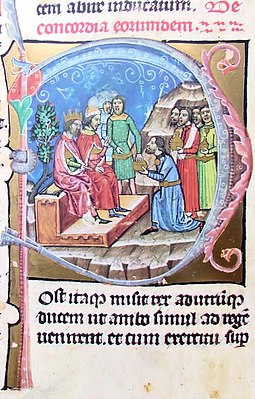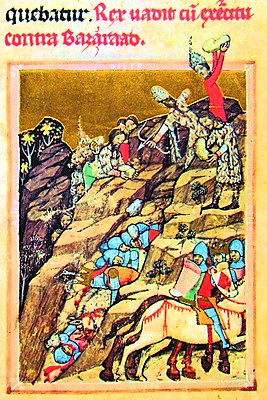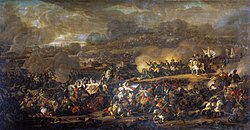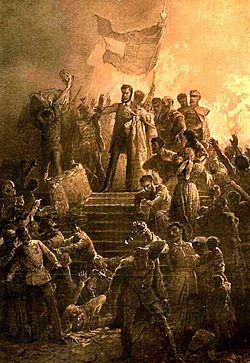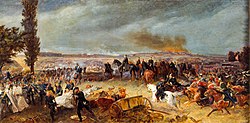List of wars involving Hungary
Appearance
| History of Hungary |
|---|
 |
|
|
This article may be too long to read and navigate comfortably. (June 2024) |
This is a list of military conflicts in which Hungarian armed forces participated in or took place on the historical territory of Hungary.
The list gives the name, the date, the Hungarian allies and enemies, and the result of these conflicts following this legend:
- Victory
- Defeat
- Result of civil or internal conflict
- A treaty or peace without a clear result, status quo ante bellum, an unknown or indecisive result
- Ongoing conflict
Middle Ages
[edit]Wars under the Árpád dynasty's rule
[edit]| Date | Conflict | Allies | Enemies | Result |
|---|---|---|---|---|
| ~800–970 | Hungarian invasions of Europe |
Kingdom of Italy West Francia Middle Francia Great Moravia Al-Andalus Principality of Serbia |
More than a century of raids and decisive wars
| |
| 811 | Battle of Pliska |
Hungarian Tribes Avar mercenaries |
Decisive Bulgarian victory
| |
| ~830 | Hungarian – Khazar War | Hungarian Tribes | Khazars | Hungarian victory |
| 862–895 | Hungarian conquest of the Carpathian Basin |
Great Moravia |
Hungarian conquest of the Carpathian Basin | |
| 894 | Byzantine – Bulgarian War | |||
| 895 | Campaign of Kiev |
Hungarian victory | ||
| 899 | Battle of Brenta |
Kingdom of Italy | Hungarian victory
| |
| 901 | Carinthian campaign
|
Duchy of Carinthia |
Hungarian victory | |
| 907 | Battle of Pressburg / Pozsony
 |
Decisive Hungarian victory
| ||
| 908 | Battle of Eisenach |
Hungarian victory
| ||
| 910 | Battle of Lechfeld / Augsburg | Swabia |
Hungarian victory
| |
| 910 | Battle of Rednitz | Duchy of Franconia Duchy of Lotharingia |
Hungarian victory
| |
| 917 | Battle of Achelous |
Pechenegs |
Bulgarian victory
| |
| 919 | Battle of Püchen | Hungarian victory | ||
| 925 | Battle of Drava River | Croatian victory | ||
| 933 | Battle of Merseburg / Riade |
German victory | ||
| 934 | Battle of W.l.n.d.r |
Pechenegs Muslim auxiliary troops |
Muslims converted to Christianity |
Decisive Hungarian – Pecheneg victory |
| 942 | Battle of Fraxinet | Muslims | Hungarian victory | |
| 942 | Hungarian raid in Spain | Caliphate of Córdoba | Hungarian victory | |
| 955 | Battle of Lechfeld / Augsburg |
Duchy of Thuringia Duchy of Swabia |
Hungarian defeat
| |
| 960 | Battle of Drina (Its existence is questionable) | Principality of Serbia | Serbian victory
| |
| 960 | Battle of Syrmia |
Principality of Serbia | Hungarian victory
| |
| 970 | Battle of Arcadiopolis | Pechenegs |
Byzantine victory
| |
| 984 | Hungarian – German border conflict at Melk |
Hungarian defeat
| ||
| 997 | Koppány's revolt |
Koppány's Army | Koppány's defeat | |
| 1002 | King Stephen I's military campaign against Gyula of Transylvania |
Gyula III of Transylvania | Successful campaign of King Saint Stephen of Hungary
| |
| 1008 (?),
1029 (?) |
King Stephen I's military campaign against Ajtony, a tribal leader in the Banat | Ajtony's Army | Successful campaign, Ajtony's defeat | |
| 1017–1018 | Hungarian – Polish war | Stalemate | ||
| ~1018 | Pecheneg attack against Hungary | Pecheneg tribes | Hungarian victory | |
| 1018 | Hungarian – Bulgarian War |
Hungarian – Byzantine victory | ||
| 1018 | The intervention of Boleslaw the Brave, Duke of Poland in the Kievan succession crisis | Pechenegs |
Temporary victory for Sviatopolk and Bolesław, Polish sack of Kiev | |
| 1030–1031 | Emperor Conrad II's military campaign against Hungary | Hungarian victory | ||
| 1041 | Uprising against King Peter Orseolo |
Hungarian nobles | Suppression of King Peter | |
| 1042–1043 | German – Hungarian wars | Hungarian defeat | ||
| 1044 | Henry III's military campaign against Hungary
|
Peter Orseolo and his allies |
Defeat of Samuel Aba, restoration of Peter | |
| 1046 | War between King Peter and Prince Andrew |
Hungarian victory | ||
| 1046 | Vata pagan uprising |
Paganic rebels | Prince Andrew's victory
| |
1051–1052
|
Emperor Henry III's military campaigns against Hungary | Hungarian victory | ||
| 1052 | Emperor Henry III's fifth military campaign against Hungary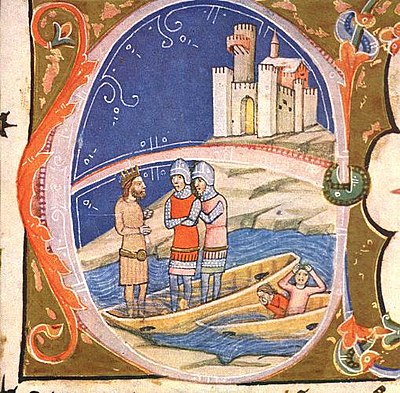 |
Hungarian victory
| ||
| 1056–1058 | German – Hungarian border war | Stalemate, treaty of Marchfeld | ||
| 1060 | Civil war between King Andrew I and his brother, Prince Béla
|
Prince Béla's victory | ||
| 1061 | Second paganic uprising | Paganic rebels | Uprising suppressed | |
| 1063 | German invasion of Hungary | Hungarian defeat | ||
| 1067 | Croatian campaign | Duchy of Carinthia | Hungarian victory
| |
| 1068 | Hungarian – Bohemian war | King Solomon of Hungary occupies Bohemia[12][13] | ||
| 1068 | Pecheneg attack against Hungary
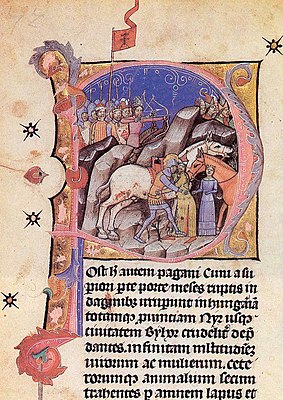 |
Pechenegs Ouzes |
Hungarian victory | |
| 1071–1072 | Hungarian – Byzantine war |
Pechenegs |
Hungarian victory
| |
| 1074 | Civil war between King Solomon and his cousins Géza and Ladislaus
|
Prince Géza and Ladislaus defeat the armies of King Solomon and Emperor Henry IV. King Solomon was dethroned. | ||
| 1075 | Henry IV's military campaign against Hungary |
Hungarian victory | ||
| The Campaigns of King Ladislaus I (1079–1095) | ||||
| 1079 | Henry IV's military campaign against King Saint Ladislaus | Hungarian victory[15] | ||
| 1085 | Cuman attack against Hungary |
Cuman tribes |
Hungarian victory
| |
| 1091 | Hungarian occupation of Croatia |
Hungarian victory
| ||
| 1091 | Cuman attack against Hungary |
Cuman tribes | Hungarian victory
| |
| 1091 | Battle near Severin / Szörényvár against the Cumans | Cuman tribes | Hungarian victory
| |
| 1092 | Ruthenian campaign by King Saint Ladislaus |
Hungarian victory
| ||
| 1094 | King Ladislaus I's intervention in a Polish conflict |
Hungarian victory
| ||
| The Campaigns of King Coloman (1095–1116) | ||||
| 1095 | Campaign in Apulia | Hungarian victory
| ||
| 1096 | King Coloman's defensive operations against the different armies of the crusaders |
French and German crusaders | Hungarian victories
| |
| 1096 | Occupation of Biograd na Moru / Tengerfehérvár | Hungarian occupation of Biograd na Moru
| ||
| 1097 | Battle of Gvozd Mountain
 |
Decisive Hungarian victory
| ||
| 1099 | King Coloman's war against the Kievan Rus' | David Igorevich's army Cuman tribes |
Hungarian defeat
| |
| 1105 | Siege of Zara and occupation of Dalmatia | Dalmatian cities |
Hungarian victory | |
| 1107 | Campaign in Apulia | Hungarian victory
| ||
| 1108 | Hungarian war with the Holy Roman Empire | Hungarian victory | ||
| 1115–1119 | Hungarian – Venetian wars | Hungarian defeat | ||
| 1123 | Stephen II's intervention in the Kievan Rus' internal conflict | Iaroslav from Vladimir |
Hungarian retreat | |
| 1124–1125 | Hungarian – Venetian war | Hungarian defeat | ||
| 1127–1129 | Byzantine-Hungarian War (1127–29) | Grand Principality of Serbia |
Stalemate, peace agreement | |
| 1132 | Hungarian – Polish war[24] | Hungarian victory | ||
| 1136–1137 | Béla II's balcanic campaigns (against Venice and the Byzantine Empire) | Hungarian victory | ||
| 1146 | Battle of the Fischa |
Hungarian victory | ||
| 1149–1152 | Géza II's intervention in the conflict between the Principality of Halych and Kievan Rus' | Kievan Rus' |
Peace agreement | |
| 1148–1155 | Hungarian – Byzantine wars | Grand Principality of Serbia |
Ceasefire | |
| 1154 | Siege of Braničevo | Cumans |
Abandoned siege, Hungarian retreat | |
| 1162–1165 | Hungarian civil war between Stephen III and his uncles Ladislaus and Stephen | Ladislaus and Stephen's army | Stephen III's victory | |
| 1167 | Battle of Sirmium | Banate of Bosnia |
Serbian Grand Principality |
Decisive Byzantine victory, Hungary lost Dalmatia |
| 1168 | Hungarian – Bohemian war | Hungarian victory | ||
| 1176 | Battle of Myriokephalon | Grand Principality of Serbia |
Sultanate of Rum | Seljuk victory
|
| 1180–1185 | Hungarian – Byzantine war | Hungarian victory, Hungary reoccupied Dalmatia | ||
| 1188–1189 | King Béla III's military campaign against Halych | Hungarian victory, occupation of Halych | ||
| 1190 | Battle of Iconium | Sultanate of Rum | Crusader victory
| |
| 1197–1199, 1203 | Civil war between King Emeric and his brother Andrew |
Emeric's victory | ||
| 1201–1205 | Emeric's balcanic wars | Grand Principality of Serbia Bosnia |
Hungarian victories | |
| 1202 | Siege of Zara |
Hungarian defeat
| ||
| 1213–1214, 1219,
1233–1234 |
King Andrew II's military campaigns against Halych | Hungarian defeat | ||
| 1217–1218 | King Andrew II's participation in the Fifth Crusade
 |
Hungarian victories on the battlefields. Muslim forces retreated to their fortresses and towns. | ||
| 1225 | King Andrew II expels the Teutonic Knights from Transylvania, the order had to move to Poland | Hungarian victory | ||
| 1237–1241 | Bosnian Crusade The Hungarian successes were followed by quick Hungarian retreat because of the Mongol invasion of Hungary | "Heretics" within the Banate of Bosnia | Stalemate after the quick Hungarian retreat due to the Mongol attacks | |
| 1241 | Battle of Mohi | Mongols | Hungarian defeat | |
| 1241–1242 | First Mongol invasion of Hungary | Mongols | Mongol victory at the Battle of Mohi. Mongols retreated within a year from Hungary due to the local Hungarian withstand. Both sides suffered a heavy casualties.[25] | |
| 1242 | Battle of Grobnik Field | Mongols | Hungarian – Croatian victory[25] | |
| 1242 | King Béla IV's punishing campaign against Frederick II, Duke of Austria | Hungarian victory[26] | ||
| 1243 | Siege of Zara | Hungarian defeat | ||
| 1246 | Battle of the Leitha River | Hungarian defeat | ||
| 1250–1278 | Hungarian – Bohemian wars | Bohemian defeat | ||
| 1259 | Battle of Pelagonia | Empire of Nicaea Cuman cavalry Hungarian mounted archers Turkish cavalry Serbian horsemen German knights |
Despotate of Epirus Triarchy of Negroponte |
Decisive Nicaean victory |
| 1260 | Battle of Kressenbrunn |
Margraviate of Moravia |
Bohemian victory | |
| 1261–1262 | Occupation of Konstantin Tih's Bulgarian Empire by King Béla IV. | Hungarian victory[27][28] | ||
| 1264–1265 | Internal conflict between King Béla IV and his son, Stephen | Stephen's victory, he got eastern Hungary as a duchy | ||
| 1268 | Mačva War Béla IV 's army captures Stefan Uroš I. Their conflict was solved with dynastic marriage. | Béla IV of Hungary | Hungarian victory | |
| 1272–1279 | Feudal anarchy | Csák noble family |
Kőszegi noble family Gutkeled noble family |
Royal victory |
| 1277 | Stefan Dragutin – Stefan Uroš I conflict | Stefan Dragutin |
Hungarian victory | |
| 1277 | Hungary's war with Litovoi in Cumania | Litovoi's army | Hungarian victory | |
| 1278 | Battle on the Marchfeld, at Dürnkrut and Jedenspeigen |
Kingdom of Germany Burgraviate of Nuremberg |
Duchy of Głogów Duchy of Lower Bavaria Duchy of Silesia |
Decisive Hungarian – German victory
|
| 1282 | Cumanic uprising
 |
Cumanic tribes | Hungarian victory | |
| 1285–1286 | Second Mongol invasion of Hungary |
Decisive Hungarian victory | ||
| 1287–1288 | Third Mongol invasion of Poland | Polish – Hungarian victory | ||
| 1291 | German – Hungarian war | Hungarian victory | ||
| 1290–1301 | Croato–Hungarian war of succession after the death of king Ladislaus IV of Hungary and Croatia | Šubić family |
Kőszegi family |
Indecisive
|
| 1298 | Battle of Göllheim | County of Nassau Electoral Palatinate |
Habsburg victory | |
Wars between 1301 and 1526
[edit]| Date | Conflict | Allies | Enemies | Result |
|---|---|---|---|---|
| 1301–1308 | Árpád war of succession, after the extinction of the Árpád dynasty | Matthew III Csák's army László Kán's army |
Kőszegi Hungarian noble family |
Angevin victory
|
| 1310–1321 | King Charles I's wars for the centralized power against the Hungarian aristocracy | Zipser Saxons |
Matthew III Csák Aba dynasty Borsa family Apor family Kőszegi family |
Royal victory
|
| 1312 | Battle of Rozgony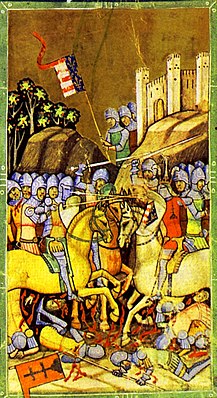 |
Zipser Saxons |
Aba dynasty Matthew III Csák |
Decisive victory for King Charles I, weakening of the magnates |
| 1319 | Belgrade and Banate of Mačva | Victory for Charles I | ||
| 1322–1337 | Hungarian – Austrian War, restoration of the western borders, defeat of Austria, Kőszegi and Babonić families | Kőszegi family Babonić Croatian noble family |
Hungarian victory | |
| 1321–1324 | Hungarian–Serbian War | Bosnia Stephen Vladislav II of Syrmia |
Hungarian defeat | |
| 1330 | Battle of Posada |
Hungarian defeat
| ||
| 1344 | King Louis the Great's invasion and occupation of Wallachia and Moldavia[29] | Hungarian victory, Wallachia and Moldavia became vassal states of King Louis the Great[30] | ||
| 1345–1358 | Hungarian – Venetian War, Venice had to pay annual tribute to Louis. Venetians also had to raise the Angevin flag on Piazza San Marco. | Decisive Hungarian victory Treaty of Zadar | ||
| 1345 | The campaign of King Louis I against the rebellious Croatian nobles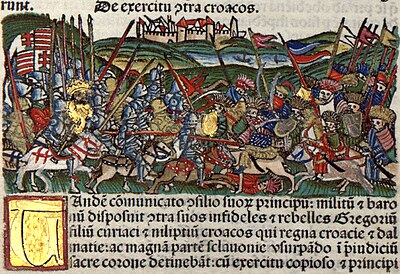 |
Croatian nobles | Hungarian victory | |
| 1345 | Hungary's war with the Golden Horde | Hungarian victory | ||
| 1347–1349, 1350–1352 | Hungarian-Naples Wars |
First campaign: temporary Hungarian victory Second campaign: status quo ante bellum | ||
| 1348 | Battle of Capua | Hungarian victory, occupation of the kingdom | ||
| 1360–1369 | Louis I's balcanic wars (against Serbia, Bulgaria, Wallachia and Bosnia) |  Second Bulgarian Empire Second Bulgarian Empire Bosnia |
Temporary Hungarian victories | |
| 1366–1367 | Hungarian – Ottoman War | Christian victory | ||
| 1369 | Wallachian campaign | Hungarian victory | ||
| 1372–1381 | War of Chioggia, Hungary defeated the Venetians in several times, and finally expelled Venetians from Dalmatia, however Genoa, Padoa and Austria lost the War. The war resulted in the Treaty of Turin (1381) | Hungarian victory, Venice had to pay annual tribute to King of Hungary | ||
| 1375–1377 | Hungarian–Ottoman War |
Hungarian victory | ||
| 1377 | Hungarian – Lithuanian war | Hungarian victory, Louis I enters Vilnius[31] | ||
| 1384–1394 | Civil war between a part of the Hungarian nobility and Mary, Queen of Hungary and Sigismund king | Horváti family |
Sigismund's victory | |
| 1394–1395 | Wallachian campaign | Wallachia became a Hungarian vassal, Mircea I the Great accepted the lordship of King Sigismund without any fight. | ||
| 1394–1395 | Moldavian campaign | Hungarian victory | ||
| 1396 | Battle of Nicopolis |
Crusader defeat
| ||
| 1407–1408 | Bosnian campaign
|
Hungarian victory
| ||
| 1411–1433 | Hungarian – Venetian War | Dalmatia became part of Venice | ||
| 1415–1419 | Hungarian – Ottoman War | Stalemate | ||
| 1419–1434 | Hussite Wars |
Hussites | Eventual defeat for Radical Hussites, victory for Moderate Hussites | |
| 1420–1432 | War of the South Danube | Armistice | ||
| 1437 | Transylvanian peasant revolt of Budai Nagy Antal | Transilvanian peasants | Defeat of the rebels | |
| 1437–1442 | Hungarian–Ottoman War | Hungarian victory | ||
| 1440 | Siege of Belgrade | Hungarian victory | ||
| 1440–1442 | Civil war between Wladyslaw I and Ladislaus | Hungarian nobles |
Cillei family and other Hungarian nobles | Peace agreement, Wladyslaw is accepted as Hungarian king |
| 1441 | Battle of Smederevo |
Hungarian victory | ||
| 1442 | Battle of Hermannstadt / Szeben |
Hungarian victory
| ||
| 1442 | Battle near the Iron Gate / Vaskapu |
Hungarian victory
| ||
| 1443–1444 | Long campaign |
Temporary Hungarian victories. | ||
| 1443 | Battle of Nish | Crusader Victory | ||
| 1443 | Battle of Zlatitsa | Ottoman victory, halting of the Crusader advance | ||
| 1444 | Battle of Kunovica |
Crusader Victory | ||
| 1444 | Battle of Varna |
Crusader defeat
| ||
| 1447 | Wallachian campaign | Hungarian victory
| ||
| 1448 | Second Battle of Kosovo / Rigómező |
Ottoman victory | ||
| 1456 | Siege of Belgrade / Nándorfehérvár |
Hungarian victory
| ||
| 1458–1459 | Matthias I's war with Ján Jiskra | Jiskra's soldiers | Royal victory | |
| 1458–1465 | War in Bosnia | Partial Bosnian territory occupied by the Ottoman Empire. | ||
| 1460 | Battle at Pojejena / Alsópozsgás | Ottoman victory
| ||
| 1464 | Siege of Jajce | Hungarian victory | ||
| 1465–1471 | Hussite uprising in North-Hungary | Czech hussite rebels | Hungarian victory | |
| 1467 | Hungarian - Moldavian war | Moldavian victory [42][43] | ||
| 1468–1478 | Bohemian War (1468–1478) | Treaty of Olmütz, Matthias became king of Bohemia | ||
| 1471 | Hungarian – Polish war. King Matthias I forced King Casimir IV to withdraw from Hungary | Hungarian victory | ||
| 1471–1476 | Matthias's intervention in the Moldovian – Ottoman War | After initial Hungarian-moldavian victories Hungary stopped the advocating of Moldavia, so Stephen III moldavian ruler became vasal of the Ottoman Empire. | ||
| 1474 | Siege of Wrocław / Breslau / Boroszló | Between 1469 and 1490, Wrocław was part of the Kingdom of Hungary. In 1474, the city was besieged by combined Polish–Czech forces. Kings Casimir IV of Poland, his son Vladislaus II of Bohemia, and Matthias Corvinus of Hungary met in the nearby village, and a ceasefire was signed according to which the city remained under Hungarian rule. | ||
| 1475 | Battle of Vaslui | Moldavian–Hungarian–Polish victory | ||
| 1476 | Siege of Šabac / Szabács | King Matthias besieged and seized Šabac, an important Ottoman border fort | ||
| 1479 | Battle of Breadfield / Kenyérmező |
Hungarian victory
| ||
| 1480–1481 | Battle of Otranto | Christian victory | ||
| 1482–1488 | Austrian – Hungarian War | Decisive Hungarian victory
| ||
| 1482 | Siege of Hainburg | Hungarian victory | ||
| 1485 | Siege of Vienna / Bécs |
Hungarian victory
| ||
| 1486 | Siege of Retz | Hungarian victory | ||
| 1486–1487 | Siege of Wiener Neustadt / Bécsújhely | Hungarian victory
| ||
| 1490–1491 | War of the Hungarian Succession | Treaty | ||
| 1490 | Battle of Csontmező | The supporters of John Corvinus | The supporters of Beatrice of Naples | The supporters of Beatrice of Naples, Stephen Báthory and Paul Kinizsi defeated John Corvinus. |
| 1491–1495 | Hungarian – Ottoman war | Stalemate | ||
| 1492–1493 | The Black Army's uprising | Black Army | Destruction of the Black Army | |
| 1499–1504 | Hungarian – Ottoman war | Stalemate | ||
| 1512–1520 | Hungarian – Ottoman war | Successful defensive operations against the Ottomans | ||
| 1514 | Peasants revolt, led by György Dózsa |
Peasants | Revolt suppressed | |
| 1520–1526 | Hungarian-Ottoman War | Hungarian defeat | ||
| 1523 | Battle of Szávaszentdemeter | Hungarian victory[45] | ||
| 1526 | Battle of Mohács |
Hungarian defeat
|
Wars between 1526 and 1699
[edit]| Date | Conflict | Allies | Enemies | Result |
|---|---|---|---|---|
| 1526–1538 | Hungarian Civil War
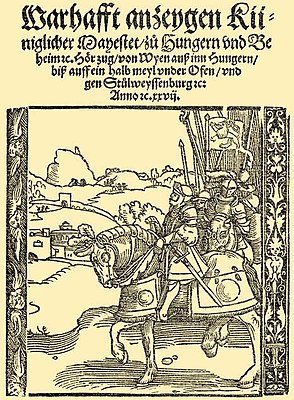 |
Inconclusive
| ||
| 1526–1527 | Jovan Nenad uprising | Hungarian victory | ||
| 1532 | Siege of Kőszeg / Güns |
Hungarian victory
| ||
| 1532 | Battle of Leobersdorf |
Habsburg victory
| ||
| 1540–1547 | Habsburg–Ottoman war | Ottoman victory
| ||
| 1543 | Siege of Esztergom |
Ottoman victory
| ||
| 1550–1558 | Habsburg–Ottoman war | Ottoman victory | ||
| 1552 | Siege of Eger |
Hungarian victory | ||
| 1562 | First Székely uprising | Eastern Hungarian victory | ||
| 1564–1565 | Hungarian war of succession[46] |
Habsburg victory; Treaty of Szatmár (13 March 1565):
| ||
| 1565–1568 | Habsburg–Ottoman war | Ottoman victory
| ||
| 1566 | Siege of Szigetvár |
Ottoman victory
| ||
| 1575 | Bekes uprising and the second Székely uprising | Transylvanian victory | ||
| 1575–1577 | Danzig rebellion | City of Gdańsk | Victory
| |
| 1577–1583 | Livonian campaign of Stephen Báthory | Victory | ||
| 1588 | Battle of Szikszó |
Hungarian victory | ||
| 1593–1606 | Fifteen Years' war |
Inconclusive | ||
| 1596 | Third Székely uprising | Transylvanian victory | ||
| 1595 | Battle of Călugăreni |
Wallachian victory | ||
| 1595 | Battle of Giurgiu / Gyurgyevó |
Hungarian victory | ||
| 1596 | Siege of Eger |
Ottoman victory, Ottomans capture Eger | ||
| 1604–1606 | Bocskai's War of Independence |
Rebel victory | ||
| 1610–1611 | Transylvanian Civil War | Transylvanian Saxons |
Transylvanian (Báthory) victory | |
| 1612–1613 | Ottoman–Transylvanian war | Ottoman victory
| ||
| 1618–1648 | Thirty Years' war | Habsburg Monarchy | Inconclusive | |
| 1632 | Peasants revolt, led by Péter Császár (in Transylvania and in the Royal Hungary) | Peasants | Revolt crushed | |
| 1636 | Transylvania Civil War | Transylvanian (Rákóczi) Victory | ||
| 1652 | Battle of Vezekény | Hungarian victory | ||
| 1656–1657 | Transylvanian military campaign against Poland | Polish-Tatar Victory | ||
| 1657–1662 | Ottoman–Transylvanian war | Ottoman victory
| ||
| 1663–1664 | Austro-Turkish War | Ottoman victory | ||
| 1664 | Siege of Léva |
Habsburg – Hungarian victory
| ||
| 1664 | Battle of Saint Gotthard  |
League victory | ||
| 1678–1685 | Thököly Uprising |
Habsburg victory | ||
| 1683–1699 | Great Turkish War | Holy League victory | ||
| 1686 | Siege of Buda |
Holy League victory
| ||
| 1697 | Hegyalja uprising | Habsburg victory
|
Wars between 1700 and 1900
[edit]- ^ In rebellion against Bavaria
Wars in the 20th century
[edit]| Conflict | Belligerents | Result | |||
|---|---|---|---|---|---|
| Date | Name | Allies | Enemies | Outcome | |
| 28 July 1914 – 11 November 1918 | World War I
 |
Central Powers |
Allied Powers Co-belligerents |
Defeat
| |
| December 1918 – June 1919 | Hungarian–Czechoslovak War
 |
Military VictoryPolitical Defeat
| |||
| 13 November 1918 – 3 August 1919 | Hungarian–Romanian War
 |
Defeat
| |||
| 6 May 1919 | Bruck an der Leitha raid | |
Antibolsevista Comité | Victory
| |
| 2-6 June 1919 | Hungarian invasion of Prekmurje | Victory
| |||
| 24 June 1919 | Ludovika Uprising | White Hungarians | Victory
| ||
| 3 August – 13 October 1921 | Uprising in West Hungary
 |
(disarmament of the rebels in 1921) |
Victory
| ||
| 20 - 23 October 1921 | Charles IV's second coup attempt
 |
Habsburg Royalists | Victory
| ||
| 14 – 18 March 1939 | Hungarian invasion of Carpatho-Ukraine
 |
Victory
| |||
| 23 – 31 March 1939 | Slovak-Hungarian War
 |
Victory
| |||
| 1 September 1939 – 2 September 1945 Hungary entered: 27 June 1941 Hungary exited: 11 May 1945 |
World War II
  |
Axis Powers Affiliate states Client States
Co-belligerents Active neutrality |
Allied Powers In exile for part of the war Other important belligerents Co-belligerents
|
Defeat
| |
| 23 October – 10 November 1956 | Hungarian Revolution of 1956
 |
Defeat
| |||
| 20 – 21 August 1968 | Warsaw Pact invasion of Czechoslovakia
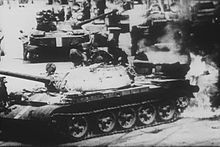 |
Warsaw Pact supported by |
Victory
| ||
Wars in the 21st century
[edit]| Conflict | Belligerents | Result | |||
|---|---|---|---|---|---|
| Date | Name | Allies | Enemies | Outcome | Losses |
| March 2003 – 2009 | Iraq War |
|
Supreme Command for Jihad and Liberation For fighting between insurgent groups, see Civil war in Iraq (2006–07). |
Victory
|
1 soldier killed
12 wounded. |
| 7 October 2001 – 30 August 2021 | War in Afghanistan | Taliban Victory / US-allied defeat
|
7 soldiers killed
14 wounded. | ||
See also
[edit]Sources
[edit]- Babinger, Franz (1978). Mehmed the Conqueror and His Time. Princeton University Press. ISBN 0-691-09900-6.
- Jefferson, John (2012). The Holy Wars of King Wladislas and Sultan Murad: The Ottoman-Christian Conflict from 1438–1444. Leiden: Brill Publishers. ISBN 978-90-04-21904-5.
References
[edit]- ^ a b c d e f Szabados, György (August 2005). "Vereség háttér nélkül? Augsburg, 955" [Defeat without background? Augsburg, 955]. Hitel – irodalmi, művészeti és társadalmi folyóirat [literary, artistic and social journal] (in Hungarian) (8).
- ^ Nagy Kálmán: A honfoglalás korának hadtörténete; Heraldika Kiadó, Budapest, 2007, p. 168
- ^ Király, Péter. Gondolatok a kalandozásokról M. G. Kellner "Ungarneinfälle..." könyve kapcsán.
- ^ Baják László (2000). p. 15
- ^ Kristó Gyula: Levedi törzsszövetségétől Szent István államáig; Magvető Könyvkiadó, Budapest, 1980 p. 248 From Miracula Sancti Georgii. Hungarian translation: "A nyugati népek, azaz a bolgárok, magyarok, szküthák, médek és türkök leghevesebb felkelése történt" English translation from the Hungarian: It was the most violent upraising of the Western nations: the Bulgarians, Hungarians, Scythians, Medians and Turks
- ^ Bóna István (2000). p. 54
- ^ Baják László (2000). p. 30–32
- ^ Bowlus 2016, p. 181.
- ^ Bowlus 2016, p. 5.
- ^ a b Bánlaky, József. "A 984. évi mölki összecsapás" [The Clash at Melk in 984]. A magyar nemzet hadtörténelme [The Military History of the Hungarian Nation] (in Hungarian). Budapest.
- ^ Rónai Horváth, Jenő (1895). Magyar hadi krónika - Első rész. - A honfoglalástól a mohácsi vészig (PDF) (in Hungarian). Budapest: Hungarian Academy of Sciences / A Magyar Tudományos Akadémia hadtudományi bizottsága.
- ^ Kosztolnyik, Z. J. (1981). Five Eleventh Century Hungarian Kings: Their Policies and their Relations with Rome. Boulder. p. 82. ISBN 0-914710-73-7.
- ^ Érszegi, Géza; Solymosi, László (1981). "Az Árpádok királysága, 1000–1301" [The Monarchy of the Árpáds, 1000–1301]. In Solymosi, László (ed.). Magyarország történeti kronológiája, I: a kezdetektől 1526-ig [Historical Chronology of Hungary, Volume I: From the Beginning to 1526] (in Hungarian). Akadémiai Kiadó. p. 89. ISBN 963-05-2661-1.
- ^ Bánlaky, József. "A belgrádi hadjárat 1071-ben és a nisi hadművelet 1072-ben" [The Campaign of Belgrade in 1071 and the Campaign of Nis in 1072]. A magyar nemzet hadtörténelme [The Military History of the Hungarian Nation] (in Hungarian). Budapest.
- ^ Bánlaky, József. "IV. Henrik hadjárata László ellen 1079-ben" [Campaign of Henry IV Against Ladislaus in 1079]. A magyar nemzet hadtörténelme [The Military History of the Hungarian Nation] (in Hungarian). Budapest.
- ^ a b c d Bánlaky, József. "László második hadjárata a kúnok ellen 1091-ben" [The Second Campaign of Ladislaus Against the Cumans in 1091]. A magyar nemzet hadtörténelme [The Military History of the Hungarian Nation] (in Hungarian). Budapest.
- ^ Bánlaky, József. "Az 1092. évi orosz hadjárat" [The Russian Campaign of 1092]. A magyar nemzet hadtörténelme [The Military History of the Hungarian Nation] (in Hungarian). Budapest.
- ^ a b Bánlaky, József. "Az 1094. évi lengyel hadjárat" [The Polish Campaign of 1094]. A magyar nemzet hadtörténelme [The Military History of the Hungarian Nation] (in Hungarian). Budapest.
- ^ Bánlaky, József. "Az 1095. évi horvátországi és apuliai hadjárat" [The Croatian and Apulian Campaign of 1095]. A magyar nemzet hadtörténelme [The Military History of the Hungarian Nation] (in Hungarian). Budapest.
- ^ a b c d e f Bánlaky, József. "A keresztes hadak átvonulása Magyarországon 1096-ban" [The Crusaders March Through Hungary in 1096]. A magyar nemzet hadtörténelme [The Military History of the Hungarian Nation] (in Hungarian). Budapest.
- ^ Bánlaky, József. "A dalmát kérdés. Bjelograd (Ó-Zára) meghódítása 1096-ban" [The Dalmatian Question. Conquest of Biograd (Old Zadar) in 1096]. A magyar nemzet hadtörténelme [The Military History of the Hungarian Nation] (in Hungarian). Budapest.
- ^ a b c Bánlaky, József. "Az 1099. évi orosz hadjárat" [The Russian Campaign of 1099]. A magyar nemzet hadtörténelme [The Military History of the Hungarian Nation] (in Hungarian). Budapest.
- ^ Bánlaky, József. "Az 1107. évi apuliai hadjárat" [The Apulian Campaign of 1107]. A magyar nemzet hadtörténelme [The Military History of the Hungarian Nation] (in Hungarian). Budapest.
- ^ Bierter Band (1821). War and Technology. Heuber. pp. 299–302.
- ^ a b Obrusánszky, Borbála. A tatárok kivonulásának okai (PDF).
- ^ Oxford University (2010). The Oxford Encyclopedia of Medieval Warfare and Military Technology: Vol. 1. Oxford University Press. p. 33. ISBN 9780195334036.
- ^ Madgearu 2017, p. 248.
- ^ Fine 1994, p. 174.
- ^ Ion Grumeza: The Roots of Balkanization: Eastern Europe C.E. 500–1500, University Press of America, 2010 [1]
- ^ Robert Maddock (2016). The 1,300 Years' War: Volume One. Xlibris Corporation. p. 449. ISBN 9781524533762.
- ^ Liviu Pilat; Ovidiu Cristea (2017). The Ottoman Threat and Crusading on the Eastern Border of Christendom During the 15th Century. Brill Publishers. p. 67. ISBN 9789004353800.
- ^ Babinger 1978, p. 20.
- ^ Weiss, David (2020). The Ottoman campaign in Wallachia and the Battle on the River Ialomiţa (1442).
- ^ a b Bánlaky, József. "A szebeni csata 1442. március 25-én" [The Battle of Szeben on 25 March 1442]. A magyar nemzet hadtörténelme [The Military History of the Hungarian Nation] (in Hungarian). Budapest.
- ^ Bánlaky, József. "A vaskapui diadal 1442 július havában" [The Triumph of the Iron Gate in July 1442]. A magyar nemzet hadtörténelme [The Military History of the Hungarian Nation] (in Hungarian). Budapest.
- ^ a b Jefferson 2012, p. 286–292.
- ^ Bury, J.B. The Cambridge Medieval History volumes 1-5. Plantagenet Publishing.
- ^ Treadgold, W.T. (1997). A History of the Byzantine State and Society. History e-book project. Stanford University Press. ISBN 978-0-8047-2630-6.
- ^ Bánlaky, József (1928). A magyar nemzet hadtörténelme (The Military History of the Hungarian Nation) (in Hungarian).
- ^ Mesut Uyar Ph.D., Edward J. Erickson (2009). A Military History of the Ottomans: From Osman to Ataturk (PDF).
- ^ Chalkokondyles, Laonikos (1464). The Histories of Laonikos Chalkokondyldes, Volume I (Translated by Anthony Kaldellis, 2014).
- ^ Engel 2001, p. 302.
- ^ Pop 2005, p. 266.
- ^ Britannica Dózsa Rebellion
- ^ Bánlaky, József. "Az 1522–1524. évi hadiesemények. Bel- és külföldi rendelkezések a török veszély elhárítására. Az 1524. évi rákosi országgyűlés főbb határozatai." [Annual military events of 1522–1524. Domestic and foreign provisions to prevent the Turkish threat. The main decisions of the Diet of Rákos in 1524.]. A magyar nemzet hadtörténelme [The Military History of the Hungarian Nation] (in Hungarian). Budapest.
- ^ (Appendix) Kokkonen & Sundell 2017, p. 24.
- ^ a b c Barta & Granasztói 1981, p. 395.
- ^ Lieber (1845), p. 345.
- ^ Dupuy (1970), p. 501.
- ^ Coppée (1864), pp. 562–565.
- ^ Nafziger & Walton (2003), p. 105
- ^ Tóth, Ferenc (2007). Saint-Gotthard 1664 : une bataille européenne. Panazol: Lavauzelle. ISBN 978-2-7025-1064-3. OCLC 173671328.
- ^ Left the war after signing the Peace of Basel with France.
- ^ Ali, Idrees (15 January 2021). "U.S. troops in Afghanistan now down to 2,500, lowest since 2001: Pentagon". Reuters. Retrieved 26 November 2021.
Sources
[edit]- Bánlaky, József (1928). A magyar nemzet hadtörténelme [The Military History of the Hungarian Nation] (in Hungarian). Budapest.
{{cite book}}: CS1 maint: location missing publisher (link) - Barta, Gábor; Granasztói, György (1981). "A három részre szakadt ország és a török kiűzése (1526–1605)". In Benda, Kálmán; Péter, Katalin (eds.). Magyarország történeti kronológiája, II: 1526–1848 [Historical Chronology of Hungary, Volume I: 1526–1848] (in Hungarian). Akadémiai Kiadó. pp. 361–430. ISBN 963-05-2662-X.
- Bowlus, Charles R. (2016). The Battle of Lechfeld and its Aftermath, August 955: The End of the Age of Migrations in the Latin West. London: Routledge. doi:10.4324/9781315241142. ISBN 978-1-351-89417-3. OCLC 965444179. Partial previews are at the 2016 edition at Google Books and the 2006 edition at Google Books.
- Engel, Pál (2001). The Realm of St Stephen: A History of Medieval Hungary, 895–1526. I.B. Tauris Publishers. ISBN 1-86064-061-3.
- Fine, John V. A. (1994). The Late Medieval Balkans: A Critical Survey from the Late Twelfth Century to the Ottoman Conquest. The University of Michigan Press. ISBN 0-472-08260-4.
- (Appendix) Kokkonen, Andrej; Sundell, Anders (September 2017). Online supplementary appendix for "The King is Dead: Political Succession and War in Europe, 1000–1799" (PDF). Gothenburg: University of Gothenburg. p. 40. Retrieved 22 March 2022.
- Kristó, Gyula; Makk, Ferenc (1996). Az Árpád-ház uralkodói (in Hungarian). I.P.C. Könyvek. ISBN 978-963-7930-97-3.
- Madgearu, Alexandru (2017). The Asanids: The Political and Military History of the Second Bulgarian Empire, 1185–1280. BRILL. ISBN 978-9-004-32501-2.
- Pop, Ioan-Aurel (2005). "Romanians in the 14th–16th Centuries: From the "Christian Republic" to the "Restoration of Dacia"". In Pop, Ioan-Aurel; Bolovan, Ioan (eds.). History of Romania: Compendium. Romanian Cultural Institute (Center for Transylvanian Studies). pp. 209–314. ISBN 978-973-7784-12-4.
- Kings and Saints - The Age of the Árpáds (PDF). Budapest, Székesfehérvár: Institute of Hungarian Research. 2022. ISBN 978-615-6117-65-6.
- Magyar Tudományos Akadémia (1987). Magyarország története - Előzmények és magyar történet 1242-ig I-II. Akadémiai Kiadó. ISBN 9789630515184.





